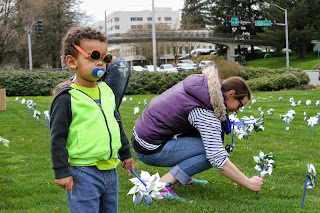There’s
no one solution to keeping kids safe. There’s no one agency, no one
organization and no one person that can protect all our children. It takes a
village to raise a child. It takes all of us to prevent child abuse and
neglect.
Here at
Strengthening Families Washington, we support communities that work with
families to build Protective Factors and support parents. Parenting is hard and
there is no one way to parent.
There
are, however, best practices to support all families. Wrapping parents in support
using the Protective Factors is both promotive and protective. We encourage
programs across the state to support families and help them grow and realize
their full potential, just like the children we endeavor to help.
Each
year, in April, we highlight our prevention work as part of the national Child
Abuse Prevention Month. The pinwheel represents the happy, healthy childhood
every child deserves. We will join with organizations across the country to
highlight our commitment to happy childhoods and our ongoing prevention work.
 In
addition to our pinwheels, we also want to invite everyone in Washington to
participate in Wear Blue Day on April 6th to stand in solidarity against child
abuse. It’s easy – just wear blue!
In
addition to our pinwheels, we also want to invite everyone in Washington to
participate in Wear Blue Day on April 6th to stand in solidarity against child
abuse. It’s easy – just wear blue!
We work
closely with our partners because we cannot do this alone. No one can do this
alone. From our
family to yours, thanks for your support.





